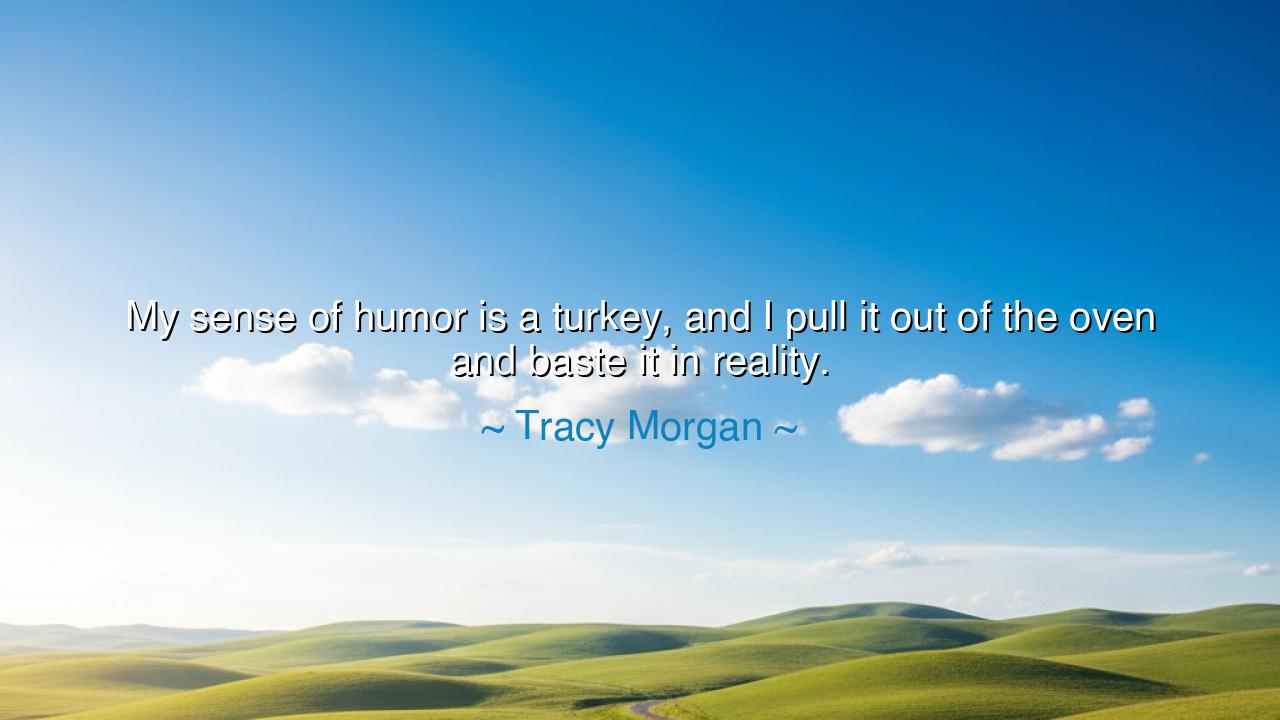
My sense of humor is a turkey, and I pull it out of the oven and






When Tracy Morgan proclaimed, “My sense of humor is a turkey, and I pull it out of the oven and baste it in reality,” he spoke with the heart of a poet disguised as a jester. These words, though wrapped in comedy, contain the flavor of ancient wisdom. He likens his humor to a turkey, something rich, hearty, and shared — a feast for the soul. Yet he does not serve it raw or hollow; he bastes it in reality, soaking it in the truth of life, its joys and its sorrows, its struggles and its triumphs. In this, Morgan teaches that the greatest laughter is not fantasy, but truth transformed into light.
For the ancients knew this too: that art, to touch the heart, must be rooted in reality. The playwright Aristophanes, who made Athens roar with laughter, drew his humor not from illusion but from the follies of men, the absurdities of politics, and the fragile pride of human ambition. His comedies were mirrors — distorted, yes, but revealing. And so it is with Morgan. His humor is a meal that nourishes because it is seasoned with life as it truly is — messy, flavorful, imperfect. Without reality, laughter is hollow; with it, laughter becomes divine.
Morgan’s words remind us that humor is not born in comfort, but in confrontation with truth. When he “bastes” his jokes in reality, he does what the wise have always done — he draws from the deep well of lived experience. His comedy, like the turkey he describes, must endure the heat of the oven before it is ready to feed others. The heat is suffering, loss, confusion, heartbreak — all that life offers to test the soul. Only after enduring that fire can one emerge with the warmth of laughter that heals rather than hides. In this, Morgan’s philosophy echoes the words of the Stoics, who taught that endurance breeds enlightenment.
We can see this truth in Morgan’s own life. After a near-fatal car accident that left him broken in body and spirit, he could have turned inward, toward bitterness or despair. But instead, he returned to the world with humor that had been reborn through pain. His laughter carried the weight of someone who had seen death and chosen to live louder than ever before. When he speaks of “basting” his humor in reality, it is not metaphor alone — it is lived truth. He had to face the fire to understand how precious the feast of life truly is.
The lesson reaches beyond the stage. It speaks to all who wish to live meaningfully. Too often, we hide from truth — we seek escape, not understanding. But Morgan reminds us that even the bitter parts of life can be turned to nourishment if we face them honestly. To baste our lives in reality is to taste both sweetness and salt, to accept joy and sorrow alike as ingredients of the same dish. Laughter, then, becomes not mockery, but gratitude — a way to bless what is real rather than wish it away.
There is a quiet power in such laughter. It belongs to those who dare to see clearly and still find joy. The farmer who smiles despite the failed harvest, the mother who jokes even as she toils through hardship, the soldier who laughs in the rain — all are basting their humor in reality. Their laughter is not foolishness; it is wisdom disguised as mirth. For they know that joy is not the absence of pain, but the triumph of spirit over it.
The teaching is eternal: Do not hide from truth. Do not fear the heat of life’s oven. Let your experiences — all of them — flavor your soul. When you speak, when you laugh, when you create, let it come from what you have truly lived. As Tracy Morgan shows, humor without reality is hollow, but humor born of truth can heal the world. So, live deeply, feel fully, and when you laugh, laugh with the strength of one who has tasted both sorrow and survival. In that laughter lies not only joy, but the wisdom of being truly alive.






AAdministratorAdministrator
Welcome, honored guests. Please leave a comment, we will respond soon